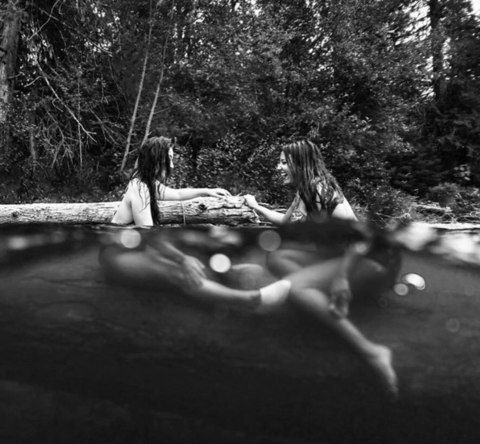
It’s been my monthly visitor for the past 15 years, and yet I’m just now, in my early thirties finding the courage to say it out loud, let mention it in public: Moontime (aka your period, aka menstruation, aka “Aunt Flo” - wtf came up with that?).
I call it “Moontime” because unlike the western scientific worldview—which still refutes that menstrual cycles are tied to the moon—Indigenous cultures from every part of the world have practices, teachings and ceremonies that honour and uphold both the connection of menstruating bodies* to the earth and the moon.
These teachings celebrate—rather than shame—the life giving** and intuitive power that menstruating bodies hold, while also providing protocols to care for and nourish our bodies during menstruation. Indigenous, traditional and ancient knowledge alike have always recognized that in the same way the moon controls the tides, it also impacts the human body—this makes sense given that our bodies are 60% water.
As a decolonial educator, environmental activist, sexualized violence prevention worker, daughter, sister, Auntie and friend I have begun to think deeply about the role that the patriarchy as a core value of colonialism has had on cultural attitudes to menstruation. I think of how many commercials I’ve been saturated with throughout my lifetime boasting tiny and covert period products so that “no one will know”, or that will enable you to still go swimming “even on your period”.
I think about the cumulative impacts of the countless times I’ve heard friends exclaim “I hate my period” or awkwardly hiding my discomfort while some guy at a house party tells a horribly disrespectful story to a roomful of people about being exposed to someone else's period (menstrual blood is always the punchline in these stories).
In contrast to this, I remember the generous Moontime teachings matriarchs have passed onto me, the Indigenous coming of age ceremonies I have been witness to, the relief and healing I feel when I am surrounded by others who hold Moontime.
Then I consider the shame I have internalized: the rejection of my own body and its power, the resentment I feel for myself during Moontime when I am in pain or overly sensitive, the anger I feel towards myself for my silence equating complicity when others mock menstruating bodies. Because of the intersectional nature of my work, I also connect those attitudes to phenomena of eating disorders, lateral violence, self-harm, impossible beauty standards, sexualized violence and femicide that are norms in this collective colonial reality.
When we are socialized to hide, silence and be shameful of a basic physical reality for menstruating bodies, the underlying message is that we ourselves are shameful - objects to be sanitized and deemed proper by a value-system that places toxic masculinity and predatory capitalism as king.
In contrast to this, I remember the generous Moontime teachings matriarchs have passed onto me, the Indigenous coming of age ceremonies I have been witness to, the relief and healing I feel when I am surrounded by others who hold Moontime teachings and we can speak openly, share knowledge and laugh until we cry about the daily realities of menstruation.
I cherish these teachings and relationships deeply and with great humility because I know so many others don’t have access to these healing spaces. That’s why when the team at joni asked me if I would be willing to share about Moontime, I was honoured. Because I DO want to start announcing my Moontime out loud, calling people out when they are disparaging menstruation and actively dismantling patriarchal systems of harm that instill shame in us beginning from childhood.
Regardless of your gender, identity, location or beliefs, this is a conversation we can all have together; so that maybe the next wave of period consciousness can look like pride, self-acceptance and empowerment, rather than silence and self loathing.
*I am using the term “menstruating bodies” to honour that not all menstruating bodies identify as female, as well as that not all female identified folx menstruate. With respect, love and commitment to representation I use this phrasing uphold space for non-binary, 2-spirit and trans folx in this conversation. Read more about gender-inclusive language.
** Not all menstruating bodies, either by choice or circumstance, give birth.
ABOUT THE AUTHOR
Nikki is a Pipil/Maya and Irish/Scottish activist, academic, Indigenous media maker, and environmental educator. She holds a master's degree in Indigenous Governance and is presently completing a Ph.D. with a research focus on emerging visual media technology as it relates to Indigenous ontology. Nikki is a doctoral fellow at the Center for Religion and Society at the University of Victoria. She designed and directed the first-ever Indigenous Storyteller edition with TELUS STORYHIVE; a project to provide over a million dollars in funding and mentorship for 30 emerging Indigenous filmmakers in BC and Alberta. Read more here about Nikki Sanchez' projects, awards and achievements, including a recent book, TEDx, award-winning documentaries, environmental stewardship, and decolonial advocacy.
